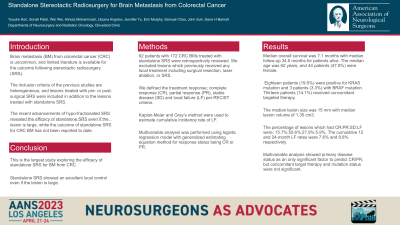Standalone Stereotactic Radiosurgery for Brain Metastasis from Colorectal Cancer
Friday, April 21, 2023


Yusuke Hori, MD
Fellow
Stanford University
Palo Alto, California, United States
ePoster Presenter(s)
Introduction: Brain metastasis (BM) from colorectal cancer (CRC) is uncommon, and limited literature is available for the outcome following stereotactic radiosurgery (SRS). The inclusion criteria of the previous studies are heterogeneous, and lesions treated with pre- or post-surgical SRS were included in addition to the lesions treated with standalone SRS. The recent advancements of hypo-fractionated SRS revealed the efficacy of standalone SRS even if the lesion is large, while the outcome of standalone SRS for CRC BM has not been reported to date.
Methods: 92 patients with 172 CRC BMs treated with standalone SRS were retrospectively reviewed. We excluded lesions which previously received any local treatment including surgical resection, laser ablation, or SRS. We defined the treatment response; complete response (CR), partial response (PR), stable disease (SD) and local failure (LF) per RECIST criteria. Kaplan-Meier and Gray’s method were used to estimate cumulative incidence rate of LF. Multivariable analysis was performed using logistic regression model with generalized estimating equation method for response status being CR or PR.
Results: Median overall survival was 7.1 months with median follow-up 34.0 months for patients alive. The median age was 62 years, and 44 patients (47.8%) were female. Eighteen patients (19.6%) were positive for KRAS mutation and 3 patients (3.3%) with BRAF mutation. Thirteen patients (14.1%) received concomitant targeted therapy. The median lesion size was 15 mm with median lesion volume of 1.35 cm3. The percentage of lesions which had CR:PR:SD:LF were; 15.7%:50.6%:27.9%:5.9%. The cumulative 12 and 24-month LF rates were 7.6% and 8.8% respectively. Multivariable analysis showed primary disease status as an only significant factor to predict CR/PR, but concomitant target therapy and mutation status were not significant.
Conclusion : This is the largest study exploring the efficacy of standalone SRS for BM from CRC. Standalone SRS showed an excellent local control even if the lesion is large.
Methods: 92 patients with 172 CRC BMs treated with standalone SRS were retrospectively reviewed. We excluded lesions which previously received any local treatment including surgical resection, laser ablation, or SRS. We defined the treatment response; complete response (CR), partial response (PR), stable disease (SD) and local failure (LF) per RECIST criteria. Kaplan-Meier and Gray’s method were used to estimate cumulative incidence rate of LF. Multivariable analysis was performed using logistic regression model with generalized estimating equation method for response status being CR or PR.
Results: Median overall survival was 7.1 months with median follow-up 34.0 months for patients alive. The median age was 62 years, and 44 patients (47.8%) were female. Eighteen patients (19.6%) were positive for KRAS mutation and 3 patients (3.3%) with BRAF mutation. Thirteen patients (14.1%) received concomitant targeted therapy. The median lesion size was 15 mm with median lesion volume of 1.35 cm3. The percentage of lesions which had CR:PR:SD:LF were; 15.7%:50.6%:27.9%:5.9%. The cumulative 12 and 24-month LF rates were 7.6% and 8.8% respectively. Multivariable analysis showed primary disease status as an only significant factor to predict CR/PR, but concomitant target therapy and mutation status were not significant.
Conclusion : This is the largest study exploring the efficacy of standalone SRS for BM from CRC. Standalone SRS showed an excellent local control even if the lesion is large.
